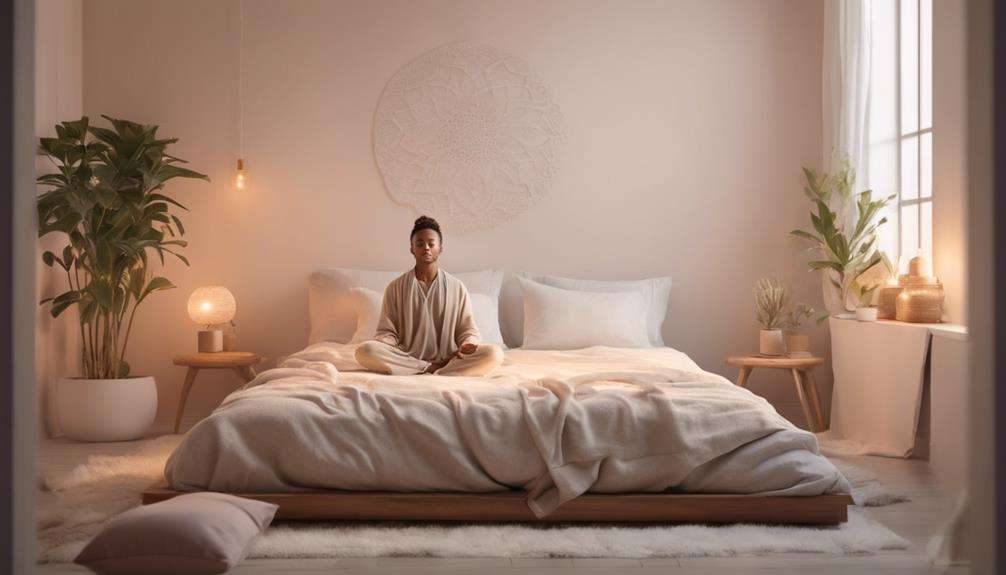Did you know that approximately 35% of adults in the United States report getting less than the recommended 7 hours of sleep per night?
Ensuring optimal sleep quality is crucial for your overall health and well-being. Discover the top 10 best practices that can significantly enhance the quality of your sleep and help you wake up feeling refreshed and rejuvenated each morning.
From simple lifestyle adjustments to establishing a consistent sleep schedule, these practices hold the key to unlocking a world of restful nights and increased vitality.
Key Takeaways
- Establish a soothing bedtime routine for improved sleep quality.
- Create a sleep-conducive environment with proper bedding and temperature.
- Engage in physical activity and mindfulness practices like yoga for better sleep.
- Maintain a consistent sleep schedule to support natural sleep patterns.
Importance of Sleep Hygiene
Optimize your physical and mental well-being by recognizing the crucial importance of good sleep hygiene. Sleep hygiene refers to a set of practices and habits that promote optimal sleep quality and duration. By developing healthy sleep habits, you can improve the overall quality of your sleep, leading to numerous health benefits. Consistent adherence to proper sleep hygiene guidelines is key to reducing daytime sleepiness and enhancing your well-being.
Creating a sleep-conducive environment, maintaining a regular sleep schedule, and engaging in relaxing bedtime rituals are essential components of good sleep hygiene. These practices can help signal to your body that it's time to wind down and prepare for restorative sleep. Avoiding stimulants like caffeine close to bedtime, limiting exposure to screens, and ensuring your sleep environment is dark, quiet, and comfortable are all crucial aspects of promoting healthy sleep habits.
Incorporating these strategies into your routine can significantly improve your sleep quality and contribute to better overall health. Prioritizing good sleep hygiene is a cost-effective and impactful way to enhance public health on an individual and community level.
Creating a Relaxing Bedtime Routine
To enhance the quality of your sleep, establish a calming bedtime routine that promotes relaxation and signals your body for rest. Engage in calming activities such as reading a book or gentle stretching before bed. These activities can help prepare your body for sleep by signaling that it's time to wind down.
Avoid screens and bright lights close to bedtime, as they can interfere with the production of melatonin, a hormone crucial for regulating sleep. Instead, opt for activities that promote relaxation, like deep breathing exercises or progressive muscle relaxation. These techniques can help reduce stress and quiet your mind before sleep.
Consider incorporating soothing aromatherapy into your routine, such as using lavender essential oil, to create a tranquil atmosphere in your bedroom. By establishing a consistent bedtime routine, you condition your body and mind to expect and prepare for a restful night's sleep each evening.
Environment Optimization for Better Sleep

Investing in a supportive mattress and quality bedding promotes proper spine alignment, crucial for enhancing sleep quality. Maintaining a cozy bedroom temperature with comfortable bedding can significantly improve your overall sleep experience.
It's recommended to set the thermostat between 65-68 degrees Fahrenheit to create optimal sleep conditions. Blocking out light using blackout curtains or a sleep mask can help induce a deeper and more restful sleep by ensuring a dark environment.
Additionally, utilizing white noise machines can effectively minimize disturbances and contribute to a peaceful sleep environment. These machines can drown out unwanted sounds, allowing you to fall asleep faster and stay asleep longer.
Mindful Eating Habits for Sleep
Enhance your sleep quality by practicing mindful eating habits that support restful nights and overall well-being. Avoid consuming heavy meals close to bedtime to prevent indigestion, which can disrupt your sleep.
If you're hungry before bed, opt for a light, healthy snack to stave off discomfort during the night. Be cautious of foods high in sugar or caffeine, as they can hinder your ability to fall asleep. Maintaining a balanced diet is key to improving sleep quality, as it provides essential nutrients that promote relaxation.
By monitoring your diet around bedtime, you can pinpoint which foods may be impacting your sleep patterns. Making mindful choices about what you eat can have a significant impact on your sleep, ensuring that you rest better and wake up feeling refreshed.
Impact of Physical Activity on Sleep

Improve your sleep quality by incorporating physical activity into your daily routine. It boosts natural sleep hormones and contributes to better overall sleep patterns. Engaging in exercise can have a significant impact on your sleep quality.
Here's how physical activity affects your sleep:
- Daily physical activity, such as going for a walk, boosts natural sleep hormones that aid in falling asleep effectively.
- The timing of your workouts can influence sleep quality, with morning exercise in bright light helping regulate the circadian rhythm for a more restful night.
- Regular exercise has been proven to enhance overall sleep quality and promote better sleep patterns, leading to a healthier and more consistent sleep routine.
Managing Stress Before Bedtime
To manage stress before bedtime effectively, engage in relaxation techniques like deep breathing and mindfulness practices.
Establishing a bedtime routine can signal to your body that it's time to wind down and prepare for sleep.
Prioritizing stress management before bed can significantly improve your sleep quality and overall well-being.
Relaxation Techniques for Stress
Engage in deep breathing exercises before bedtime to reduce stress and promote relaxation for optimal sleep quality.
Here are three relaxation techniques to help manage stress before bed:
- Deep Breathing Exercises: Inhale deeply through your nose, hold for a few seconds, and exhale slowly through your mouth. Repeat this process several times to calm your mind and body.
- Meditation Techniques: Practice mindfulness or guided meditation to clear your thoughts and create a sense of inner peace before sleep.
- Visualization Exercises: Imagine yourself in a tranquil setting, focusing on the sights, sounds, and sensations to help alleviate stress and anxiety.
Establish Bedtime Routine
Establishing a consistent bedtime routine can significantly reduce stress levels before sleep, leading to improved sleep quality and overall well-being.
Engaging in relaxation techniques like deep breathing and visualization can help lower stress, preparing your body for rest.
Writing down any concerns or tasks before bed can clear your mind, reducing bedtime stress and promoting better sleep.
Managing worries and stress before bedtime is crucial to prevent racing thoughts that hinder falling asleep easily.
A calming bedtime routine, such as reading a book or taking a warm bath, signals to your body that it's time to wind down.
Incorporating stress-relieving activities like meditation or gentle stretching before bed promotes relaxation and improves sleep onset.
Mindfulness Practices Before Bed
Implementing mindfulness practices such as deep breathing or meditation before bed can effectively calm the mind, reducing stress levels and enhancing sleep quality. Engaging in these practices can lead to a state of relaxation that's conducive to a restful night's sleep.
Here are three key benefits of incorporating mindfulness practices before bedtime:
- Mindfulness reduces the production of stress hormones, aiding in relaxation.
- Deep breathing techniques can lower your heart rate, preparing your body for sleep.
- Practicing mindfulness before bed can help alleviate racing thoughts and anxiety, promoting a peaceful state of mind for better sleep quality.
The Role of Yoga in Sleep Quality
Yoga offers proven benefits for improving sleep quality through stress reduction and relaxation. By incorporating specific poses and breathing techniques like Savasana and Pranayama, you can calm your mind and body before bedtime, promoting restful sleep.
Research supports the idea that regular yoga practice can enhance overall sleep duration and quality, making it a valuable tool in addressing sleep issues.
Yoga and Relaxation Techniques
To enhance the quality of your sleep, consider incorporating proven relaxation techniques such as yoga into your routine. Yoga is a powerful tool for improving sleep quality by reducing stress and anxiety, ultimately leading to better rest. Here are three ways in which yoga can benefit your sleep:
- Stress Reduction: Yoga helps lower stress levels, allowing your body and mind to relax, making it easier to fall asleep and stay asleep.
- Improved Sleep Patterns: Regular yoga practice has been associated with enhanced sleep patterns, including longer duration and fewer disruptions during the night.
- Mindfulness and Relaxation: Yoga promotes mindfulness and relaxation, aligning your body's natural sleep-wake cycle and preparing you for a peaceful transition to sleep.
Yoga for Better Sleep
Consider incorporating proven relaxation techniques such as yoga into your routine to optimize your sleep quality. Yoga has been scientifically proven to enhance sleep by reducing stress, anxiety, and symptoms of insomnia.
Engaging in yoga before bedtime can help quiet the mind and ease the body into a state of relaxation conducive to better sleep. Specific yoga poses like legs up the wall, child's pose, and corpse pose are particularly beneficial for promoting restful sleep.
Furthermore, the practice of yoga and meditation can boost melatonin production, a hormone vital for regulating the sleep-wake cycle. Those who regularly practice yoga often experience improvements in sleep duration, efficiency, and overall sleep quality.
Embrace yoga as a powerful tool for enhancing your sleep experience.
Benefits of Meditation for Better Sleep

Meditation offers a proven pathway to enhance sleep quality and address insomnia symptoms effectively. Research shows that incorporating mindfulness meditation into your bedtime routine can have significant benefits for your sleep.
- Reduced Insomnia Symptoms: Studies have demonstrated that meditation can decrease insomnia symptoms by 27%, leading to improved overall sleep quality.
- Faster Sleep Onset: Practicing mindfulness meditation before bed has been linked to a 50% reduction in the time it takes to fall asleep, helping you drift off more quickly.
- Improved Sleep Duration: Mindful meditation techniques can significantly reduce sleep disturbances and enhance sleep duration, allowing you to enjoy more restful nights.
Breathing Techniques for Sleep Enhancement
To enhance your sleep quality, consider incorporating deep breathing techniques into your bedtime routine. These techniques can help you relax both your body and mind, setting the stage for a restful night's sleep.
Deep Breathing Benefits
Engage in deep breathing techniques before bedtime to enhance your sleep quality by promoting relaxation and reducing stress and anxiety. Deep breathing has numerous benefits for improving your sleep experience:
- Reduces Stress and Anxiety: Deep breathing before bed can help calm your mind and lower stress levels, setting the stage for a more restful sleep.
- Slows Heart Rate: Practicing deep breathing techniques can slow down your heart rate, signaling to your body that it's time to relax and prepare for sleep.
- Boosts Oxygen Supply: Deep breathing increases the oxygen flow to your brain, enhancing cognitive function and contributing to a more rejuvenating sleep.
Incorporating deep breathing exercises into your nightly routine can lead to more restful and efficient sleep patterns.
Relaxation Through Breath
Before bedtime, practicing relaxation through specific breathing techniques can significantly enhance the quality of your sleep by promoting a calm and stress-free environment conducive to restful rest.
Deep breathing techniques, such as diaphragmatic breathing, can lower heart rate and blood pressure, preparing your body for a night of restful sleep. Controlled breathing exercises are effective in reducing stress and anxiety, helping to ease your mind for a peaceful sleep experience.
Incorporating breath-focused meditation techniques before bed can improve your focus, calm your mind, and aid in falling asleep faster. Consider trying alternate nostril breathing to balance your nervous system and enhance overall relaxation.
Enhancing Sleep With Breath
Enhance your sleep quality through the practice of specific breathing techniques designed to promote relaxation and reduce stress levels, ultimately aiding in achieving a restful night's sleep. Incorporating deep breathing exercises, such as diaphragmatic breathing, can be highly beneficial for improving your sleep.
Here's how breathwork can enhance your sleep:
- Deep breathing exercises promote relaxation and reduce stress levels.
- Diaphragmatic breathing helps calm the nervous system, preparing your body for sleep.
- Controlled breathing patterns can slow your heart rate, lower blood pressure, and induce a state of relaxation conducive to falling asleep.
Establishing a Consistent Sleep Schedule
Establish a consistent sleep schedule by going to bed and waking up at the same time daily to regulate your body's internal clock for optimal sleep quality. This routine supports your circadian rhythm, the body's natural sleep-wake cycle, ensuring the release of essential sleep hormone melatonin at the right times. By maintaining a regular sleep pattern, you enhance the efficiency of your rest, falling asleep faster and experiencing higher-quality sleep overall.
Disrupting your sleep schedule can throw off your body's internal clock, making it harder to fall asleep and reducing the restorative benefits of sleep. Irregular sleep patterns hinder the natural production of melatonin, impacting your ability to achieve deep, restful sleep. To improve your sleep quality, aim for a consistent sleep routine that aligns with your body's natural rhythms. Strive for a steady sleep/wake cycle to optimize the duration and quality of your nightly rest.
Frequently Asked Questions
What Is the Best Strategy for Optimal Sleep?
To optimize sleep quality, focus on your sleep environment, bedtime routine, and stress management. Ensure a dark, quiet, and cool sleep space, establish a relaxing routine, and manage stress to enhance overall sleep quality effectively.
What Is the 10 3 2 1 0 Rule for Sleep?
In your quest for better sleep, embrace the 10 3 2 1 0 rule. Cut caffeine early, ditch screens, create a cozy sleep nest, wind down before tucking in, and banish disruptions for the ultimate slumber.
How Do I Get the Optimal Amount of Sleep?
To get the optimal amount of sleep, focus on your sleep environment, routine, and duration. Ensure a comfortable setting, stick to a consistent bedtime, and aim for 7-9 hours nightly. These practices enhance sleep quality and overall well-being.
What Are the 5 Principles of Sleep Hygiene?
To optimize sleep quality, focus on your bedtime routine and bedroom environment. Limit electronics and caffeine close to bedtime. Manage stress and incorporate exercise. These practices enhance sleep hygiene and help you achieve restful sleep.
Conclusion
In conclusion, prioritizing optimal sleep quality is crucial for overall well-being.
Did you know that according to the National Sleep Foundation, adults aged 18-64 need 7-9 hours of sleep per night for optimal health?
By following the 10 best practices for better sleep, you can improve your sleep outcomes and lead a healthier life.
Remember, quality sleep is essential for your physical, mental, and emotional health. Make it a priority!






